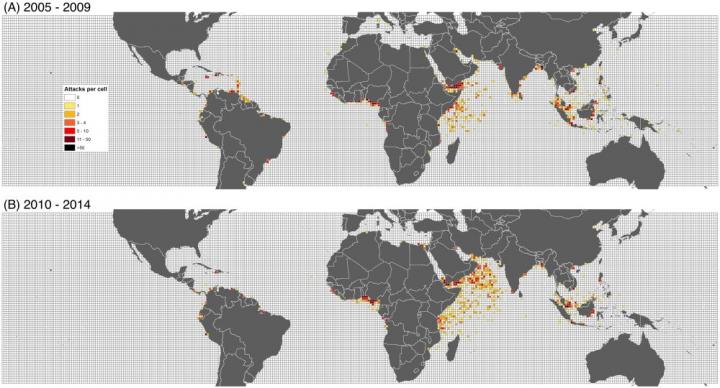New spatial analysis suggests anti-piracy efforts could include policing of illegal fishing practices

Credit: Desai et al, PLOS ONE 2021
(CC-BY 4.0, https://creativecommons.org/licenses/by/4.0/)
A new investigation of maritime piracy reveals that pirate attacks occur more frequently in locations where destructive and illegal fishing practices take place. Raj Desai and George Shambaugh of Georgetown University in Washington, D.C., present these findings in the open-access journal PLOS ONE on February 24, 2021.
Most of the world’s fishers rely on small-scale fisheries that are vulnerable to destructive and illegal fishing practices. In response, Desai and Shambaugh hypothesized, some fishers may turn to piracy to mitigate loss of income and protect against illegal foreign fishing fleets. However, previous research has not adequately addressed the location-specific factors that influence piracy, leaving this hypothesis unresolved.
To fill this gap, the researchers divided the world’s oceans into 1 degree-by-1 degree cells for a new, data-driven, spatial investigation into the influence of destructive and illegal fishing practices on piracy incidents that took place between 2005 and 2014. Unlike many previous studies, the analysis accounted for increased likelihood of piracy in some locations due to proximity to areas already experiencing piracy.
This investigation showed that pirate attacks occur more frequently in locations with higher levels of destructive fishing practices, such as high-bycatch fishing and fishing that destroys local habitats. This correlation persisted even when accounting for conditions in neighboring coastal locations.
Greater incidence of piracy was also associated with illegal, unreported, and unregulated fishing. In addition, piracy was associated with fragile governments, but not with coastal drought or population density.
These findings suggest that anti-piracy solutions could extend beyond enforcement of anti-piracy laws and include efforts to address illegal or destructive fishing practices. Future research could explore this issue in the long-term and investigate whether areas that have been overfished due to harmful practices might experience increasingly stubborn piracy problems.
The authors add: “Between 2005 and 2014, piracy spiked the most in seas where fishing catch from high-bycatch, destructive, and illegal practices were common. This suggests that piracy seems to be, in part, a response by small-scale fishermen to perceived threats to their livelihoods from industrial fishing fleets.”
###
Citation: Desai RM, Shambaugh GE (2021) Measuring the global impact of destructive and illegal fishing on maritime piracy: A spatial analysis. PLoS ONE 16(2): e0246835.
https:/
Funding: The authors received no specific funding for this work.
Competing Interests: The authors have declared that no competing interests exist.
In your coverage please use this URL to provide access to the freely available article in PLOS ONE:
https:/
Media Contact
Raj M Desai
[email protected]
Related Journal Article
http://dx.




